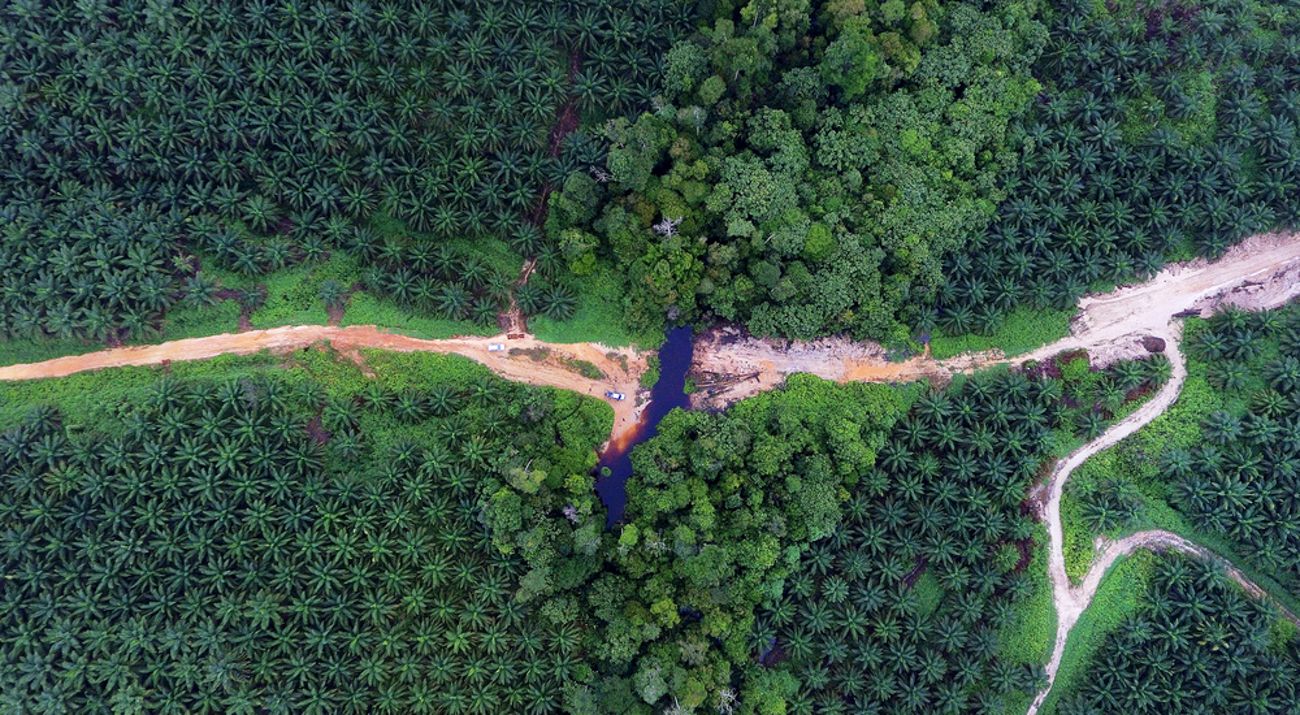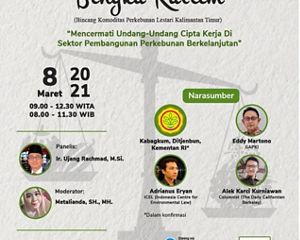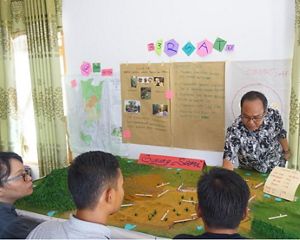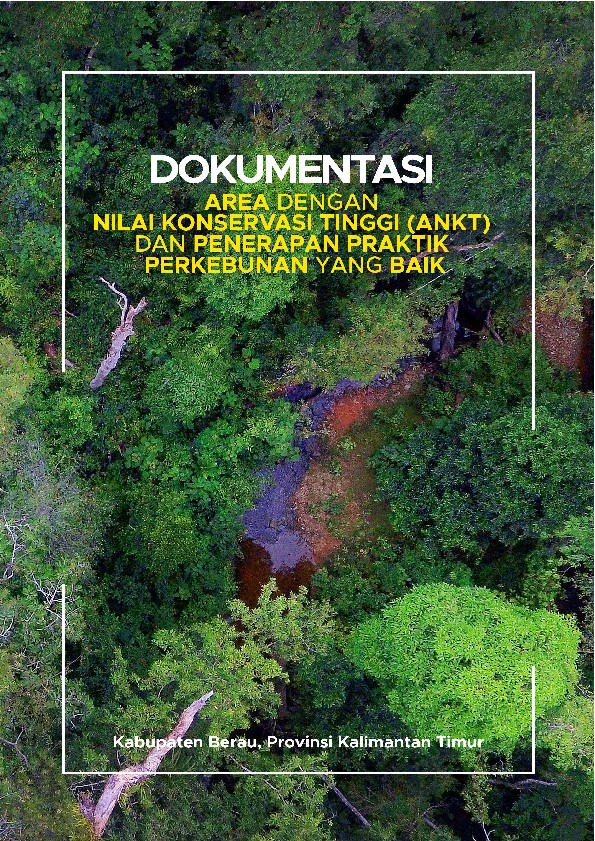The economic transformation initiated by the East Kalimantan Government through the "Green East Kalimantan" program in 2010 continues to be rolled out and implemented in every development strategy. East Kalimantan Province aims to remove its economic dependence on extractive industries and switch to the renewable sector, one of which is plantations. Plantations, particularly oil palm, have significantly contributed to East Kalimantan's economy.
- The Gross Regional Domestic Product (GRDP) from plantations is 4.97 percent (Rp. 16.95 trillion or US$1.12 billion) of East Kalimantan's total GRDP
- Total Plantation Business Permits issued in East Kalimantan reached 2.75 million hectares.
- Active oil palm plantation area in the region: 1.3 million hectares
(Central Statistics Agency (BPS), 2021)
For this reason, the provincial government realizes the need for policies to align the plantation sector with green development through a scheme known as sustainable plantations. The Nusantara Nature Conservation Foundation (YKAN) supports them through a low-emission oil palm plantation program funded by the "International Climate Initiative" of the Federal Ministry of Environment, Nature Conservation and Consumer Protection (BMUV-IKI). The effort started in 2015 with work locations in East Kalimantan Province and Berau District. Together with stakeholders, this program is implemented to achieve four outputs.
- First: strengthening land use, governance, and government capacity for planning and oversight.
- Second: socio-economic and environmental analysis that supports sustainable policy-making in the management of oil palm plantations.
- Third: Capacity building for land and conflict management for communities to benefit from oil palm plantations.
- Fourth: establish a multi-stakeholder forum as a space for dialogue to encourage the settlement of oil palm plantation disputes.
Sustainable Oil Palm Management in Berau and East Kalimantan
The Government of the Republic of Indonesia is now prioritizing strengthening people's economy, raising Indonesia's competitive capacity at the global level, and protecting the environmental qualities. One of the sectors that support those three priorities is the oil palm sector. The management of sustainable oil palm is a key to achieving those priorities.
Yayasan Konservasi Alam Nusantara (YKAN), Deutsche Gesellschaft für Internationale Zusammenarbeit (GIZ), and Climate Policy Initiative (CPI) are partnering with BAPPENAS and partners at the national, provincial, and regency level to develop sustainable oil palm management.
This initiative is hoped to support achieving the Government of Indonesia's social, economic, and environmental priorities. Sustainable oil palm management is intended to ensure that the oil palm sector can develop profitably (economic purpose), but in a way that still respects and protects local communities' economic, social, and environmental rights (social and environmental purposes).
This program would be implemented in 2015 - 2022 to produce five outcomes:
- Strengthening governance, land use, and government capacity to conduct planning and observation,
- Socio-economic and environmental analyses that support the creation of sustainable oil palm management policies,
- Strengthening community capacity in landscaping and managing conflict so that they can gain benefits from oil palm plantation,
- Providing policy recommendations and holistic incentives for regional government and private sectors, and
- Forming a multi-party forum as a dialogue space for encouraging issues resolutions in oil palm. This project is financed by the Government of Germany (Federal Ministry for Environment, Nature Conservation, and Nuclear Safety/BMU).
Why Berau District & East Kalimantan
The oil palm sector contributes to the third-largest exported commodity in Indonesia and one-third of the Regional Gross Domestic Product (Penerimaan Domestik Bruto Daerah). Small farmers manage about 40% of oil palm plantations in Indonesia, which are the source of their livelihoods.
East Kalimantan Province has five flagship commodities: oil palm, cocoa, rubber, pepper, and coconut. From these five commodities, oil palm commodity contributes to 18.34 million tons TBS (Tandan Buah Segar or fruit-bunch) or 4.3 million CPO (Crude Palm Oil), followed by cocoa (2,513 tons), rubber (52,817 tons), pepper (5,799 tons), and coconut (11,013 tons). However, the total area of plantations is 1,389,845 hectares, consisting of 255,919 hectares of community/self-reliant oil palm plantations, 176,109 hectares of non-oil palm plantations, and 957,817 hectares of main plantations (East Kalimantan Plantation Office (Dinas Perkebunan Kaltim), 2019).
Based on those data, oil palm plantations also contributed to deforestation of 576,188 hectares in 2006 - 2016 from land opening on a large scale and not following the sustainable development principles (Greenhouse Gas Emission Reduction Through Deforestation and Forest Degradation Prevention Program Based on Jurisdiction 2020 - 2024).
Berau is the third-largest regency in East Kalimantan, and more than 75% of its areas are still covered with primary and secondary forests. Similar to most areas in East Kalimantan, the oil palm sector in Berau Regency has grown rapidly over the last five years (Berau Carbon Program 2011 - 2015). The area of oil palm plantations in Berau in 2016 has reached 120,000 ha or almost 1% of the total area of oil palm plantations in Indonesia and 10% of the total area of oil palm plantations in East Kalimantan. However, as stated in the Medium-Term Regional Development Plan (Rencana Pembangunan Jangka Menengah Daerah or RPJMD) 2021 - 2026 document of Berau Regency, the regency wants to do more than improve the agricultural economy in a general sense. The regency intends to improve the economy by protecting natural resources for the next generations, aligned with the East Kalimantan Province plantation development vision, a sustainable plantation development based on the Green Economy concept application.







